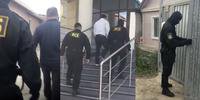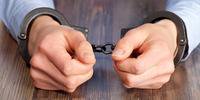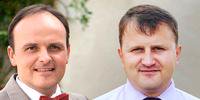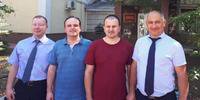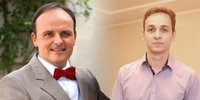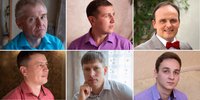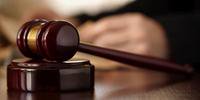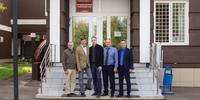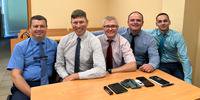The Case of Kochnev and Others in Orenburg
Filter
- #
The Investigative Directorate of the Investigative Committee of the Russian Federation for the Orenburg Region initiates a criminal case for faith under Articles 282.2 (1), 282.2 (2). 7 believers become defendants in the case at once: Alexander Suvorov, Vladimir Kochnev, Vladislav Kolbanov, Pavel Lekontsev, Alexey Matveev, Sergey Logunov and Nikolai Zhugin.
- #
Law enforcers are conducting searches in 4 settlements of the Orenburg region in the homes of 19 families. Vladislav Kolbanov, Aleksandr Suvorov and Vladimir Kochnev are sent to temporary detention facilities, and other believers are signed up for not leaving.
- #
The Industrial District Court of Orenburg chooses a measure of restraint in the form of detention for 2 citizens. The court places Vladimir Kochnev and Aleksandr Suvorov in a pre-trial detention center for 58 days, until July 14, 2018. The court transfers Vladislav Kolbanov from the special detention center to house arrest. The hearing lasts from 11 a.m. to almost midnight.
- #
- #
The Orenburg Regional Court is considering an appeal against the arrest of Kochnev and Suvorov. About 100 people come to the courthouse to support their fellow believers. The court upholds the chosen measure of restraint.
- #
- #
Judge of the Leninsky District Court of Orenburg Inna Yangubaeva makes a decision to soften the measure of restraint for Kochnev and Suvorov. Imprisonment is replaced by house arrest. The believers spent about 78 days in the pre-trial detention center.
- #
The court softens the measure of restraint for Vladislav Kolbanov and Vladimir Kochnev. House arrest is replaced by a ban on certain actions (leaving the house at night and communicating with other defendants in the case, including by phone and via the Internet). Kolbanov spent 2 days in the temporary detention facility and 146 days under house arrest. Kochnev spent 78 days in pre-trial detention and 70 days under house arrest.
- #
The Leninsky District Court of Orenburg lifts some restrictions on believers (to leave their homes at night).
- #
The Leninsky District Court of Orenburg, chaired by Judge Irina Inozemtseva, refuses the investigator to toughen the measure of restraint for Vladislav Kolbanov and Vladimir Kochnev.
- #
- #
The criminal case against Aleksandr Suvorov is separated into a separate proceeding.
- #
The investigation brings a new charge against the believers. The articles under which each of them is accused have been changed. The preliminary investigation is coming to an end. This is followed by the stage of familiarization with the case materials.
- #
- #
The Investigative Committee announces the completion of the investigation. "The investigation has collected sufficient evidence," the official press release said.
The criminal case goes to the Industrial District Court of Orenburg. It will be considered by Judge Tatyana Gorbacheva.
- #
Judge of the Industrial District Court of Orenburg Tatyana Gorbacheva returns the criminal case against 6 believers to the prosecutor's office due to the vague nature of the charge and the lack of motives and goals of the alleged crime. For example, it is often unclear from the prosecution which actions were committed by Logunov and which by Suvorov.
- #
- #
The public prosecutor does not agree with the court's conclusions about the significant procedural violations committed by the preliminary investigation bodies, which create obstacles to the consideration of the case by the court. The submission in the case of Kochnev and other defendants is sent to the judicial board for criminal cases of the Orenburg Regional Court.
- #
Rosfinmonitoring adds nine defendants to the List of Terrorists and Extremists and blocks their accounts. It is noteworthy that Sergey Logunov and Vladimir Kochnev were already included in this list in 2012, and their accounts were already blocked.
In addition, four of the defendants have minor children: Alexei Matveev and Alexander Suvorov have one child each, Nikolai Zhugin has two, and another believer is raising three children. As of April 2020, similar sanctions have been imposed on more than 200 Jehovah's Witnesses throughout Russia.
- #
The criminal case against Aleksey Matveev is separated into a separate proceeding.
- #
More than a year after the case was returned to the prosecutor's office, it again goes to the Industrial District Court of Orenburg.
- #
Judge Igor Izmailov "in order to eliminate doubts about the impartiality and objectivity of the judge" satisfies the defense's motion for his own recusal. According to the lawyer, Izmailov cannot participate in the process, since he had previously "actually considered this criminal case at the stage of preliminary investigation." For example, he sent defendants into custody and house arrest, extended their detention, allowed searches in the homes of believers, etc. The defense believes that these circumstances testify to the personal interest of Judge Izmailov in the outcome of the case under consideration. The state prosecutor does not object to the recusal.
- #
A new judge, Diana Sudogina, enters the case. Also, one of the defendants changes his lawyer. The court gives him time to familiarize himself with the case file, which includes 62 volumes. The next hearing is scheduled for May 20.
- #
About 90 people come to the courthouse to support the believers.
The judge satisfies the motion of the defense for the admission of listeners to the hearings.
Based on the decision of the UN working group , the defense petitions for the termination of the criminal case. The defendants also ask for the appointment of lawyers, but the judge rejects both motions.
- #
During the three sessions, the prosecutor reads out the indictments. The defendants speak with an attitude to the prosecution.
- #
In addition to the participants in the process, 10 listeners are allowed into the courtroom. The court grants the lawyer's request that the beliefs of Jehovah's Witnesses should not be considered during the trial.
- #
The materials of the case, including transcripts of worship services in 2017-2018, are being examined.
The court decides to hold further hearings without listeners due to the epidemiological situation.
- #
About 60 people come to the courthouse to support the believers. The court is examining the recordings of telephone conversations of Alexander Suvorov, whose case is separated into separate proceedings.
- #
The court rejects the petition of the defense on the inadmissibility of consideration in the framework of this criminal case of materials not related to it.
- #
The 17th volume of the case materials is being examined. The defendants Logunov and Kochnev testify.
- #
From November 2021 to January 2022, 20 sessions are held, during which the court examines the materials contained in volumes 8-54 of the criminal case. Hidden video recordings of spiritual and entertaining meetings with contests, jokes, songs and dances in two cafes in Orenburg are shown. Religious studies and socio-religious examinations of these materials are also considered.
- #
Over the course of seven sessions, the court hears recordings of Vladislav Kolbanov's telephone conversations.
- #
The court devotes five April hearings to reviewing material evidence against Sergey Logunov, obtained in the course of operational-search activities. Among them are recordings of his telephone conversations and video recordings of meetings with friends in a café.
- #
The court is examining the books seized from Sergey Logunov, including "About People Who Never Part with the Bible" by Sergey Ivanenko.
- #
The judge prohibits the defense from reading excerpts from N. S. Gordienko's book "Russian Jehovah's Witnesses: History and Modernity" seized during the search. The lawyer objects, since the defendants have the right to examine material evidence without restrictions.
- #
The material evidence against Vladimir Kochnev is being re-examined, since violations were committed during their previous examination.
- #
One of the lawyers is petitioning for the recusal of Judge Diana Sudorgina. The judge refuses and proceeds to the questioning of witnesses.
Sergey Logunov's colleague gives a positive characteristic of the believer, noting that he is a reliable and executive worker. The witness says that he has never heard Logunov declare the superiority of his religion over others or infringe on the rights of followers of other faiths.
Another witness, an elderly woman, explains that some of the phrases included in the interrogation record do not belong to her. She explains that it was difficult for her to verify the recorded statements due to her old age, the search and several interrogations in one day. The witness also states that she does not know the defendants.
- #
FSB officer A. Zhavoronkov, who conducted operational-search measures against the defendants, is being interrogated. He could not explain exactly what signs he saw of the continuation of the activities of the LRO of Jehovah's Witnesses in Orenburg in their actions.
He also states that the Supreme Court of the Russian Federation, by its decision in 2017, did not prohibit the doctrine of Jehovah's Witnesses, and their legal activities did not continue after this decision. He also notes that the Constitution of the Russian Federation gives the right to freely believe in God.
- #
More than 50 people come to support believers. The prosecution examines the evidence against Lekontsev and Zhugin.
- #
Prosecution witnesses are being questioned. The chief expert of the computer examination department, R. Y. Gaisin, who was present at the search of the defendant Kolbanov, finds it difficult to answer the court's questions, explaining this by the fact that a lot of time has passed since the search.
During the interrogation, another witness, a colleague of the defendant Logunov, uses Article 51 of the Constitution of the Russian Federation, which allows him not to testify against himself and his loved ones.
- #
More than 40 people come to support believers. 19 of them, including a representative of the local media, are allowed to attend the hearing.
The interrogation of Sergey Logunov's colleague continues. He is shown video recordings of episodes where he and the defendant talk about the Bible with another colleague in a working setting.
- #
The defense objects to the interrogation of the acting head of the Center for Countering Extremism of the Ministry of Internal Affairs of Russia in the Orenburg Region, Stepan Belashenko, arguing that in 2012-2014 he participated in the persecution of believers in Orenburg and openly expressed his negative attitude towards Jehovah's Witnesses. The objection was attached by the court to the case file. Nevertheless, the prosecution is questioning this witness.
Answering the lawyer's question: "What are the signs of the activities of the LRO banned in Russia?", the witness mentions purely religious actions: singing songs, praying, studying religious literature in the format of questions and answers. However, these actions do not apply to the LRO either in fact or by virtue of statutory activities, with which he is not familiar. At the same time, Belashenko admits that the doctrine of Jehovah's Witnesses is not prohibited.
- #
More than 60 people come to the courtroom, 19 of them are allowed to attend the hearing.
The interrogation of witness Belashenko continues.
The defense points out contradictions in his testimony. Thus, he accuses Logunov of using the official website of Jehovah's Witnesses (banned in the territory of the Russian Federation), but at the same time he does not provide evidence and cannot explain exactly how he established this fact.
Belashenko also claims that Logunov used a translation of the Bible, declared extremist, in conversations with a colleague. The defense notes that the conversations incriminated to the believer took place long before the publication was included in the list of extremist materials.
- #
Prosecution witnesses are being interrogated - the owners of two cafes where believers gathered for friendly meetings.
The first witness knows only the defendant Kochnev personally. She claims that she is not familiar with the concept of a LRO of Jehovah's Witnesses and that individuals, not representatives of a legal entity, came to the café.
The second witness says that he does not recognize any of the defendants, that the term "LRO" was not mentioned in the lease agreement and no meetings were held on behalf of the LRO in the café.
- #
There are 14 people present at the hearing, and about 35 people are outside the courthouse to support the believers.
FSB officer A. S. Zhavoronkov is being re-interrogated. He again acknowledges that the creed of Jehovah's Witnesses is not forbidden and that believers can worship together. He did not record any signs of the legal entity's activities in accordance with the charter of the LRO, such as voting or drawing up documents in writing, during the ORM.
- #
An employee of the military registration and enlistment office is summoned for questioning, which confirms that in 2013 the defendant Kolbanov did alternative civilian service. She had not heard anything about the legal entities of Jehovah's Witnesses.
Further, Logunov's former boss testifies. He characterizes the defendant as a disciplined worker. He had not heard anything about his faith, as well as nothing about the activities of any legal entity.
The testimony of the deceased prosecution witness I. Shatilov is read out.
- #
The lawyer declares the challenge of the judge, pointing to 6 arguments. The court refuses to satisfy the petition.
The interrogation of CPE officer Stepan Belashenko is resumed. He cannot identify the defendant Kochnev on the recordings of the ORM, although he had previously described him in detail. The man also suggests that the services of Jehovah's Witnesses can be held with competitions and informal communication. Belashenko explains the substitution of words in the transcripts of the ORM by the fact that he "heard them that way."
- #
During the interrogation of the prosecution witness, the question of the relationship between family members with different religious views is raised. Defendants Zhugin and Logunov explain to the court that the happiness of their families and the families of other Jehovah's Witnesses whom they know personally is not hindered by different religions.
The defense shows the court children's photos and videos, as well as positive characteristics from the school psychologist and teachers. This proves to the court that children raised by their mother, who is one of Jehovah's Witnesses, and by their father, who no longer shares the religious views of the family, grow up happy and balanced. They are open, sociable, developed, have friends among classmates and study well. The prosecution witness himself admits that this is the merit of both parents, including his ex-wife.
- #
Prosecution witness V. Yudin is being questioned. His testimony in court contradicts what he said earlier during interrogation by the investigator.
Ten years earlier, Yudin had already participated in a similar trial as a witness for the prosecution against the believers Logunov and Kochnev, and then he also provided false information about the events in the case.
- #
The interrogation of prosecution witness Yudin continues. Answering most of the questions, he uses the phrases "it seemed so to me", "I thought so at that time".
A witness for the prosecution is shown video recordings of two meetings of believers in a café. To the question of the defendant Lekontsev, which of the meetings was a divine service, and which was a meeting of the LRO, the witness Yudin replies that when they drank tea, danced and held competitions, it was a meeting of the LRO, and when they listened to the program, it was a divine service.
The defense lawyer submits a second petition for the discovery of documents in another criminal case 10 years ago. When comparing Yudin's testimony in both criminal cases, it becomes obvious that he misled the court by indicating incorrect dates and other inaccurate information.
- #
Specialist Marina Efimenko, who works in the theological seminary, is being interrogated. During interrogation, she says that she is a history teacher and that she has no special religious education. From her responses, it is clear that she does not distinguish between the concepts of "legal entities (LROs)" and "religious groups".
- #
The interrogation of prosecution witness Yefimenko continues. It recognizes that the creed of Jehovah's Witnesses cannot be banned. Nor can she indicate what techniques she used to analyse MPA materials.
- #
Witness Efimenko in her testimony admits that she drew conclusions based only on a limited number of video materials and transcripts provided to her. The specialist says that she has only a general idea of Jehovah's Witnesses and their creeds.
The prosecution refuses to question four prosecution witnesses.
- #
The questioning of defense witnesses begins.
Vladimir Kochnev's wife testifies. She characterizes her husband positively.
- #
Larisa Logunova, Sergey Logunov's wife and Vladimir Kochnev's sister, is being interrogated. She positively characterizes her husband and brother. She also explains that she has never been a member of the LRO and she does not need to belong to any legal entity to profess her faith.
- #
The interrogation of defense witnesses - neighbors of the defendants Lekontsev and Kochnev - continues. They characterize men as sympathetic, kind and positive-minded people.
- #
The court continues to question relatives and neighbors of the defendants. Kochneva's stepdaughter explains to the court that she is not a Jehovah's Witness herself, but the difference in religious views has never interfered with good family relations. The witness also provides the court with a selection of photographs and videos that positively characterize Kochnev. The judge refuses to review these materials, but attaches them to the case.
Vladislav Kolbanov's mother explains that her son's religious beliefs do not prevent him from maintaining close relations with relatives who have different views. In addition, the witness says that her son, because of his peaceful convictions, was doing alternative civilian service in a nursing home.
- #
The witness, Vladislav Kolbanov's sister, says that her brother is a kind, open person who likes to do nice things for family members and other people.
- #
The court tries to continue the hearing in the absence of a sick lawyer, forcing the defendants to use the services of a lawyer by appointment. The defendants object, as this is a violation of their constitutional right. The judge does not take into account the objections and continues the hearing, but later satisfies the defendants' requests to postpone the hearing.
- #
The lawyer challenges the judge, pointing out her bias against the defendants and the defense. The judge, without retiring to the deliberation room, makes a decision on the spot - to refuse the challenge.
- #
The meeting is attended by the chairman of the Industrial District Court of Orenburg, Andrey Vygolov. He takes a seat with the audience and takes notes during the meeting.
The interrogation of the defendant Kolbanov's sister continues, during which the judge makes remarks to the lawyer, removes questions directly related to the charges, and does not allow objections to be raised.
- #
The lawyer orally challenges the judge.
During the interrogation of two witnesses of the defense, the court removes the lawyer's questions, and also refuses to provide material evidence on which the first witness can give an explanation. The lawyer notes that the judge deprives the defense of the opportunity to defend itself by examining the evidence and refuses to further interrogate this witness.
- #
The next witness of the defense is interrogated. The court removes many of the lawyer's questions, arguing that other defense witnesses have already answered similar questions. The judge prevents the lawyer from making objections to the record of court hearings, and then interrupts the defense counsel and transfers the right of questioning to other participants.
The judge asks the defendants to bring no more than one witness per day. He also refuses to provide the lawyer with material evidence - audio recordings of telephone conversations of the defendant Kolbanov.
- #
The questioning of the defence witness is ongoing. The court does not allow the lawyer to interrogate the witness on the issue of telephone conversations with Suvorov, pointing out that his case is separated into separate proceedings.
The prosecutor reads out the transcripts of the audio recordings of telephone conversations, but refuses to find out the details or exclude them.
The lawyer proceeds to the study of the case materials from the 41st volume. Archival documents on the persecution of Jehovah's Witnesses in Germany are considered.
- #
The defendant Logunova recuses the judge, the court refuses to satisfy.
The lawyer requests the questioning of the witness who appeared at the courthouse. The court refuses despite the fact that the lawyer justifies the reason for the interrogation - the witness is an eyewitness to the episode imputed to the defendant.
- #
A witness for the defense is being questioned. He gives a positive characterization of the defendant Kolbanov.
- #
The court refuses to question witnesses for the defense and prohibits the study of case materials from volume 42. The lawyer objects, as this deprives the defense of the opportunity to provide evidence of the innocence of the defendants.
- #
The court refuses to provide material evidence seized during the search of the defendants, as well as to view video files of worship services recorded during the ORM.
- #
The wife of the defendant Lekontsev is being interrogated - the defense and the prosecution have practically no questions.
The court refuses to examine three more witnesses for the defense and to examine volumes 43-54 of the case file. Only individual documents in volumes 1 through 3 are considered.
- #
Specialist linguist Galina Ivanenko is being interrogated.
When asked by the lawyer whether the materials provided by the ORM contain signs of incitement to hatred, enmity, superiority, the specialist answers: "I can't even imagine how such peace-loving statements, only aimed at establishing peace in the family, peaceful relationships between people, how they can be interpreted as harming someone ... It seemed surprising to me that such a question arises at all ... Everywhere we are talking about universal values. I even have the impression that after reading these texts, I only became better. ... I didn't see a single phrase expressing the idea of revenge, hatred, violence."
The court shall attach an expert opinion to the case file.
- #
Religious expert Ekaterina Elbakyan, chief analyst of the Center for Spiritual and Moral Education and Theology of the Russian Academy of Education, is being interrogated.
Elbakyan shows the difference between missionary activity and the dissemination of one's own religious beliefs. She explains: "The dissemination of religious beliefs is a private matter of a person who was at a worship service, he was emotionally overwhelmed, sat down on a bench in the park, someone sat down with him, and he wanted to share with the person and began to tell him about God. But it's like I came from a movie, call my friend and tell her what an extraordinary movie I watched, go watch it. That doesn't mean I'm working as an advertising agent for this film."
When asked by a lawyer whether the concept of "followers of the LRO" is applicable to a legal entity, religious scholar Elbakyan explains: "You can't say 'followers of this parish' or 'followers of this mosque'. You can say "members". Followers may be of some kind of creed. Is the LRO creating a new creed of Jehovah's Witnesses?"
Elbakyan also says that she was present at the trial in the Supreme Court on April 20, 2017 and was declared there as an expert. She emphasizes that the ban did not apply to the beliefs of Jehovah's Witnesses, it was about the liquidation of legal entities, and for non-statutory activities.
- #
The court satisfies the refusal of the defendant Lekontsev from the lawyer by agreement. The court continues the hearing, without giving Lekontsev time to find a lawyer, arguing that a lawyer by appointment is present at the hearing.
The defendant Lekontsev recuses the presiding judge, which is refused.
- #
Hearings on the case of believers from Orenburg are held almost every day. More than 40 people come to support the accused.
Defendant Lekontsev re-applies for a new lawyer by agreement with a request to give a reasonable time to search for a lawyer and familiarize himself with the case materials. But the court again refuses and continues the hearing.
The judge allows the questioning of one witness instead of two, arguing that enough witnesses have already been questioned on these circumstances.
- #
For the third time, the court refuses to find a new lawyer for the defendant Lekontsev under the agreement.
The defense continues to examine the materials of the case - volumes from the 30th to the 56th.
The lawyer filed a motion for the interrogation of Astakhova, whose examinations formed the basis of the indictment. The court postpones the decision of the issue, giving the prosecutor time to familiarize himself with the materials of the examination. The court once again refuses the lawyer to challenge the presiding judge.
- #
Pavel Lekontsev's new lawyer is filing a petition for time to familiarize himself with the case materials. The court allocates 1 day for this, although there are 62 volumes in the case.
- #
The defense draws the court's attention to the transcripts of the ORM, where canonical terminology is often used, which is not related to the activities of legal entities. The singing of songs and prayers also confirm that the divine services of Jehovah's Witnesses are recorded in the materials of the ORM.
Lekontsev's lawyer files a motion for the disclosure of UD materials refuting the defendant's guilt in the incriminated criminal act.
- #
The defense draws the court's attention to the fact that the expert Astakhova does not have a religious education. Also, Vladimir Kochnev's lawyer re-submits a petition for the interrogation of a defense witness, but the court refuses.
- #
The defense emphasizes that the expert Chernyaev, who determined that the materials found on electronic devices seized from believers belonged to the organization of Jehovah's Witnesses, does not have a special religious education. Lawyers file a petition for the interrogation of this expert in order to find out how the examination was carried out and what prompted him to such conclusions. The prosecutor reports that he does not see the need for this.
The defense file a motion to exclude from the case file the testimony of the defendants Sergey Logunov and Vladimir Kochnev, given in 2012 and 2016 in other criminal cases. The defendants do not confirm their testimony, as it was given without a lawyer. The court does not grant the request.
The lawyer filed a motion to summon for questioning the expert Chernyaev, who conducted examinations on the devices seized from the defendants. He explains that since the examiner does not have the necessary education to carry out such examinations, he was provided with a number of canonical concepts that had to be found in technical devices, such as "pioneer", "elder" and so on. However, not a single concept related to the activities of the LRO was declared to the expert. Later, the court granted this request of the defense.
- #
The defense continues the interrogation of the defendant Vladislav Kolbanov. He explains the details of the two episodes imputed to him: in November and December 2017, he was in a café for a religious group service. He informs the court that neither he nor anyone else present represented himself as members of Jehovah's Witnesses' legal entities or acted on their behalf.
- #
The defense continues the interrogation of the defendant Vladislav Kolbanov.
The lawyer filed a motion to request the materials of another criminal case of 2012-2014, in which prosecution witness V. Yudin also testified against the defendants Kochnev and Logunov.
- #
The court refuses to request materials from 2012-2014, considering that it does not apply to the present case.
Vladislav Kolbanov explains the details regarding the recordings of his phone calls. Within the framework of the MPA, detailed transcripts were not compiled, but only descriptions of conversations were made. At the same time, the operational officer who compiled them used words that were beneficial to the investigation, but which were not really there. For example, words such as "members of the organization", "headed" and other similar terms were used in the description.
The defendant refuses to answer some of the prosecutor's questions, as he believes that he distorts the meaning of his answers and incorrectly fixes them. Also, when asking questions, the prosecutor relies on falsified wording from the description of telephone conversations.
- #
The court rejects the motion to exclude from the case file two disks with Kolbanov's telephone conversations, although the dates of the calls contained on them go beyond the scope of the charge.
The defendant Kolbanov and his lawyer object to the actions of the state prosecutor and the judge.
The defendant's lawyer notes that the court refuses to interrogate several defense witnesses who could give information about Suvorov's telephone conversations. The court has repeatedly pointed out that his case was separated into a separate proceeding and there was no need to explain telephone conversations with him. However, during the interrogation of Kolbanov, the court allows the prosecutor to ask the defendant questions about Suvorov's telephone conversations
The lawyer begins the interrogation of the defendant Pavel Lekontsev.
- #
The prosecutor requests a sentence of imprisonment in a penal colony for all defendants: Vladislav Kolbanov - 3.5 years, Vladimir Kochnev, Pavel Lekontsev and Sergey Logunov - 3 years, Nikolai Zhugin - 2.5 years.
During the debate, the prosecutor asks to exclude from the charge Vladislav Kolbanov Part 1 of Article 282.3 of the Criminal Code of the Russian Federation (financing) and leave only Part 2 of Article 282.2 (participation), as well as to reclassify Part 1 of Article 282.2 of the Criminal Code of the Russian Federation as part 2 of Article 282.2 of the Criminal Code of the Russian Federation.
- #
Believers deliver the last word.
The last word of the defendant Nikolai Zhugin in Orenburg The last word of the defendant Pavel Lekontsev in Orenburg The last word of the defendant Sergey Logunov in Orenburg The last word of the defendant Vladimir Kochnev in Orenburg - #
- #
- #
The Leninsky District Court of Orenburg cancels the suspended sentence of Vladimir Kochnev and removes his criminal record.
- #
Judge Andrey Zaloshkov granted Sergey Logunov's petition for the early cancellation of the suspended sentence and the removal of the conviction, since the believer had served half of the probationary period.
